Opening up: HAAi is exiting lockdown with an assured vision and daring debut album
HAAi announces her debut LP 'Baby, We're Ascending' and talks to Katie Thomas about growing in confidence as a musician, connecting with her community, and bringing up new artists
On November 5, 2021, after several pandemic-related postponements, Teneil Throssell, AKA HAAi, played all night long at Village Underground in East London. With eight hours at her disposal, she had space in the early stages of the night to experiment, tapping into lower BPMs than you might expect from her usually breathless DJ sets. At some point in those early, slower moments, HAAi played ‘Be Good’, a track she released on her label Coconut Beats in 2017. ‘Be Good’ chugs along at around 100 BPM—ideal for an early doors dancefloor—but crucially, the track also features HAAi’s vocals. Encouraged by her partner Alice, it was the first time she’d played it in a set.
“I’ve always felt weird about playing something I’m singing on,” Throssell explains over coffee and hummus crisps in her East London home. “What am I meant to do when the bit comes on where I’m singing?” For someone who spent years playing and singing in bands before starting out in dance music, Throssell’s anxiety about exposing her own voice on music she has produced is surprising. But, she says, “it’s one thing to make glitchy beats that go on for hours, but it’s a whole lot more to put words down and have people hear them.”
As it turned out, playing a track from her first EP as HAAi to a room full of fans went down a treat. “It was crazy!” she says. “It was like everyone in the room knew the track and so many people were singing along. I welled up. All the fears I had about my voice, they were so much in my head.”

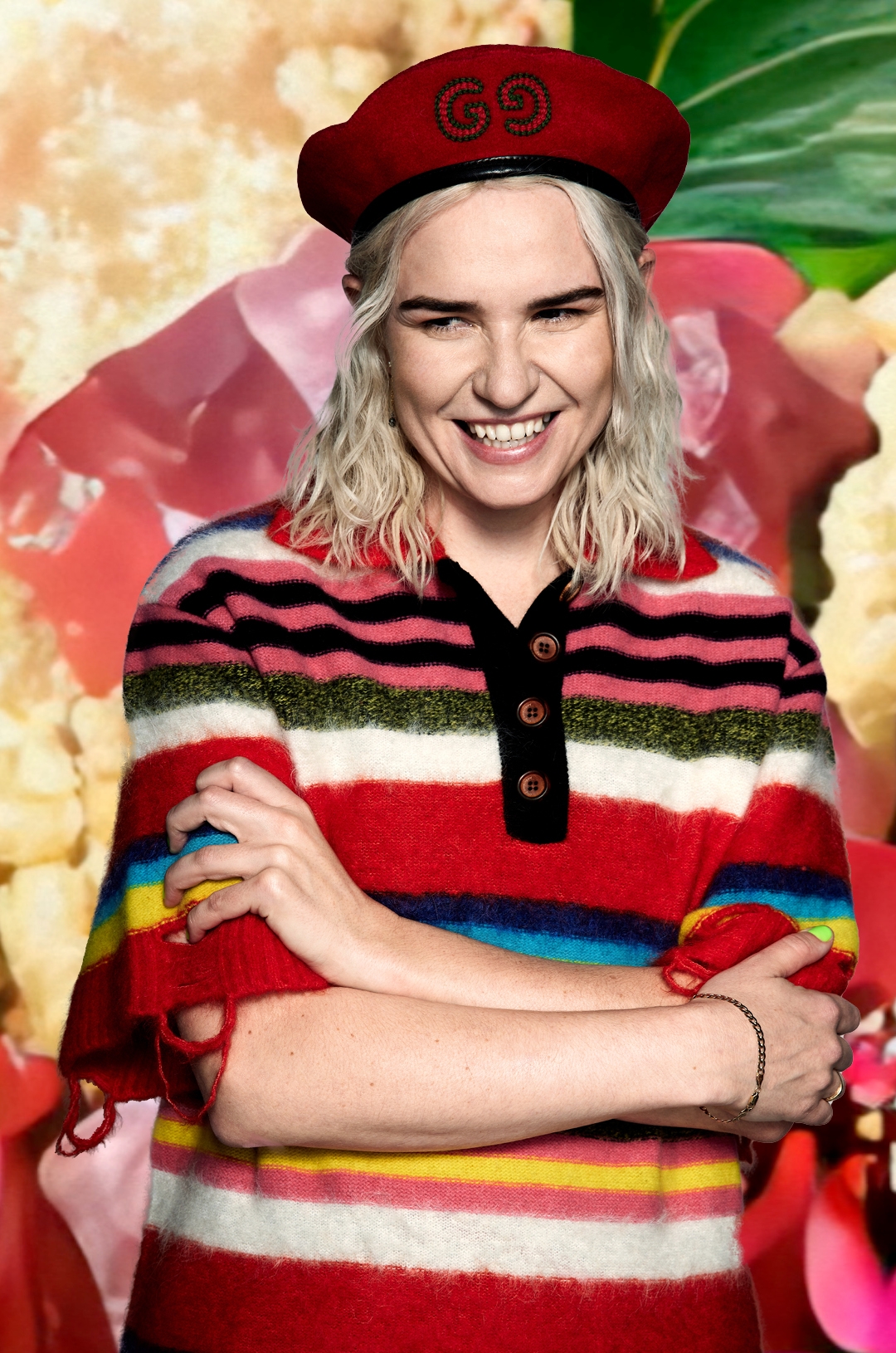
After cutting her teeth playing Ridley Road Market Bar in Dalston every week, before impressing the bookers at Phonox in Brixton when she supported Jacques Greene, HAAi’s ascent as a DJ has been a whirlwind. She began a weekly Phonox residency (which she held for two years) as a relative newcomer in October, 2016, and by 2019, she was being booked for a peak-time set on the iconic Genosys stage in Block9 at Glastonbury. From pummelling techno to breaks and heady ‘90s rave, HAAi’s sets are fast and furious, weird and wonderful. In her own words, her style of DJing is chaotic: an exhilarating chaos that has earned her a following of devoted fans. At her New Year’s Eve show at Phonox a few weeks ago, there were people on the dancefloor who’d travelled all the way from India to see her play.
In 2020, after self-releasing her first two EPs (2017’s ‘Be Good’ and ‘Motorik Voodoo Bush Doof Musik’ in 2018), HAAi joined the ranks at Mute Records, the legendary London independent label that, since 1978, has released music by Depeche Mode, Fever Ray and Plastikman. Two Mute-released EPs, ‘Systems Up, Windows Down’ and ‘Put Your Head Above The Parakeets’ largely reflected how she DJs—fierce, mechanical techno, grinding electro and cacophonous, unpredictable percussion.
Read this next: HAAi has a thousand new plans
Teneil Throssell has a smile that lights up her whole face, and a warm demeanour that makes you feel immediately at ease. She talks openly and excitedly about anything and everything, and doesn’t shy away from the elements of our conversation that require sensitivity and careful consideration. On the day we meet, she’s dressed in a crisp white shirt, chunky loafers and black trousers. Her white blonde hair is tucked behind her ears, and she’s sporting a bright red cap. Near the kitchen table, where we sit to talk, she has her Badly Drawn DJs portrait hanging on the wall. If you’re familiar with Badly Drawn DJs, you’ll know that they are usually monochrome line drawings. Not HAAi’s though, hers has her trademark yellow tinted sunglasses. It prompts a conversation about the glasses, which, though not particularly expensive, came from a small shop abroad that has since closed. Regretfully, she has either lost or broken every single one of the many pairs she bought.

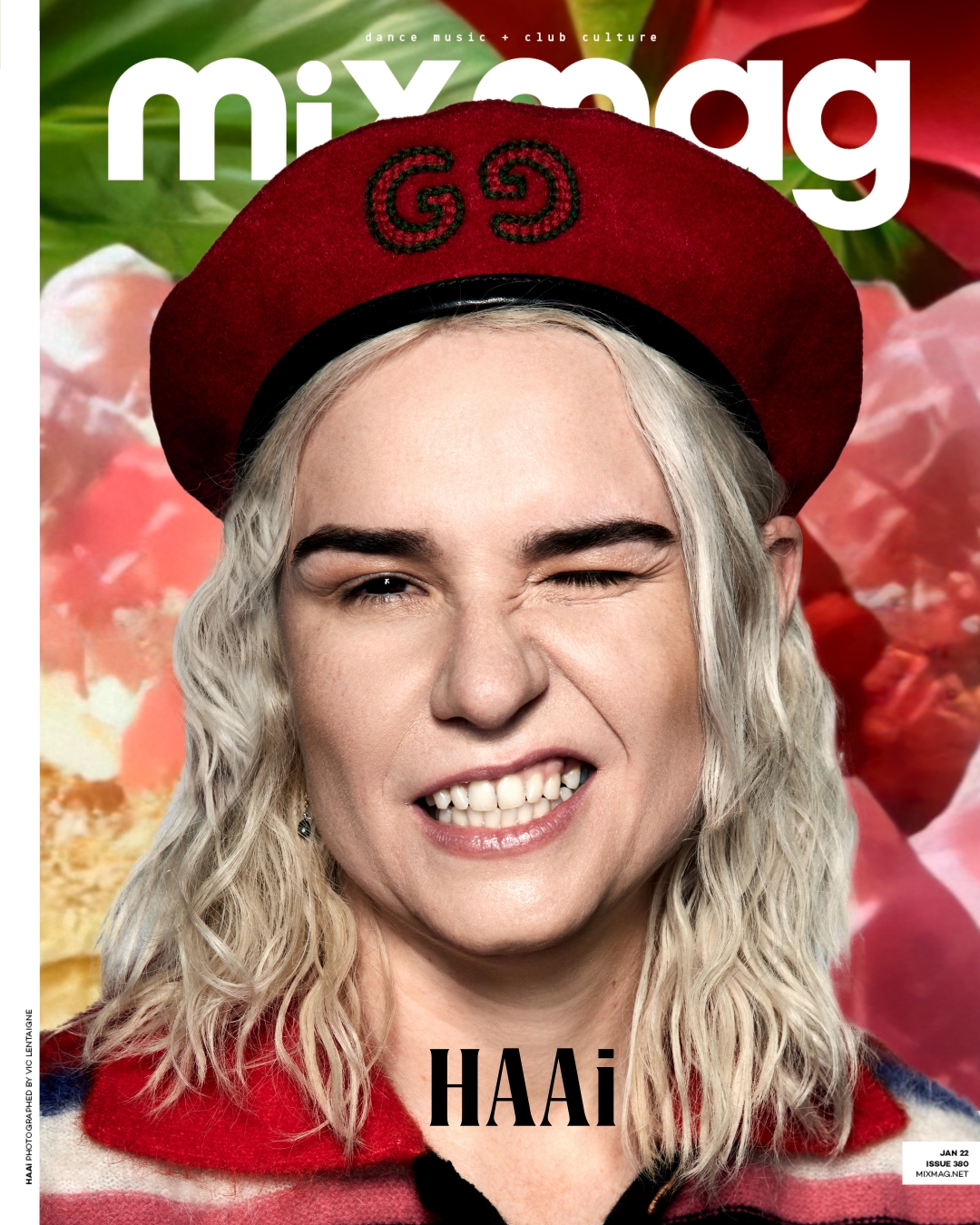
HAAi’s impending debut album, ‘Baby, We’re Ascending’, is due out in June. On it, Throssell exposes her voice, and her lyrics, more than ever before. Having made the record in lockdown, the vote of confidence at Village Underground was exactly what she needed. “It’s such a leap from what I’ve done before,” she says, reflecting on her releases to date. She’s been writing music with an album in mind for a few years, but with such a hectic schedule, describes the process as “just pushing ideas around the plate.”
But then, of course, COVID-19 brought everything to a sudden halt. As with everyone doing their best to navigate the pandemic, Throssell’s life in lockdown had peaks and troughs. But of one thing she is certain: If COVID-19 hadn’t come crashing into our lives when it did, we’d not be readying ourselves for a HAAi album right now.
Read this next: The year of no gigs
Throssell spent lockdown in London with Alice. Their home is a colourful warehouse conversion that’s flooded with light, filled with plants, records, and until recently a table tennis table—a lockdown purchase that provided hours of entertainment. The plants have been suffering recently, she confides. The giant eight-year-old Monstera has had a particularly hard time. Sure enough, it’s not giant anymore, as their two adopted cats have decided it’s good to eat. “I said to Alice, ‘are our cats vegan?’’
2020 was set to be Throssell’s busiest year of shows to date. She was excited about the year to come and felt confident about how her career was progressing. “People were starting to take more notice of what I was doing,” she says. But being forced to slow down had its benefits, namely that it allowed her to have what she calls a renaissance with the music-making side of her brain. “There’s no doubt that DJing is something that I love so fucking much,” she explains. “But it was nice to have the space to remember that I’m a musician first, and to really dive back into that.”
Besides table tennis and making music, Throssell rode the waves of the pandemic by trying to stay as positive as she could. Some days she felt excited about producing, and on other days she felt hopeless about the world. But something that helped and gave her much needed structure was volunteering at her local food bank. “I think it’s an important thing to do, especially for people who do a job like we do,” she says, referring to herself and friend Daniel Avery, who volunteered with her. “We have such a privilege, so it’s important to really be a part of your community and give back as much as you can.”
Read this next: 10 UK club nights that support good causes
When clubs and dancefloors began to open up again, HAAi’s first show back was The Nation of Gondwana in Germany. She was booked to play one of the festival’s most coveted sets—sunrise over the lake. Having never had an anxious relationship with DJing in the past, Throssell played for three hours and felt wracked with nerves throughout. “I felt so out of practice,” she says. “I’d always felt so in tune with reading a crowd until then, I got myself into a bit of a funk.” The experience sparked an existential trail of thought where she found herself thinking, “in a world where people are dying and people are doctors and nurses, what the fuck is DJing?”
The following weekend back in the UK, Throssell played Standon Calling and fabric’s reopening weekend. It was totally reaffirming. “I saw how happy it makes everyone feel,” she says. “I cut myself a bit of slack after that.”
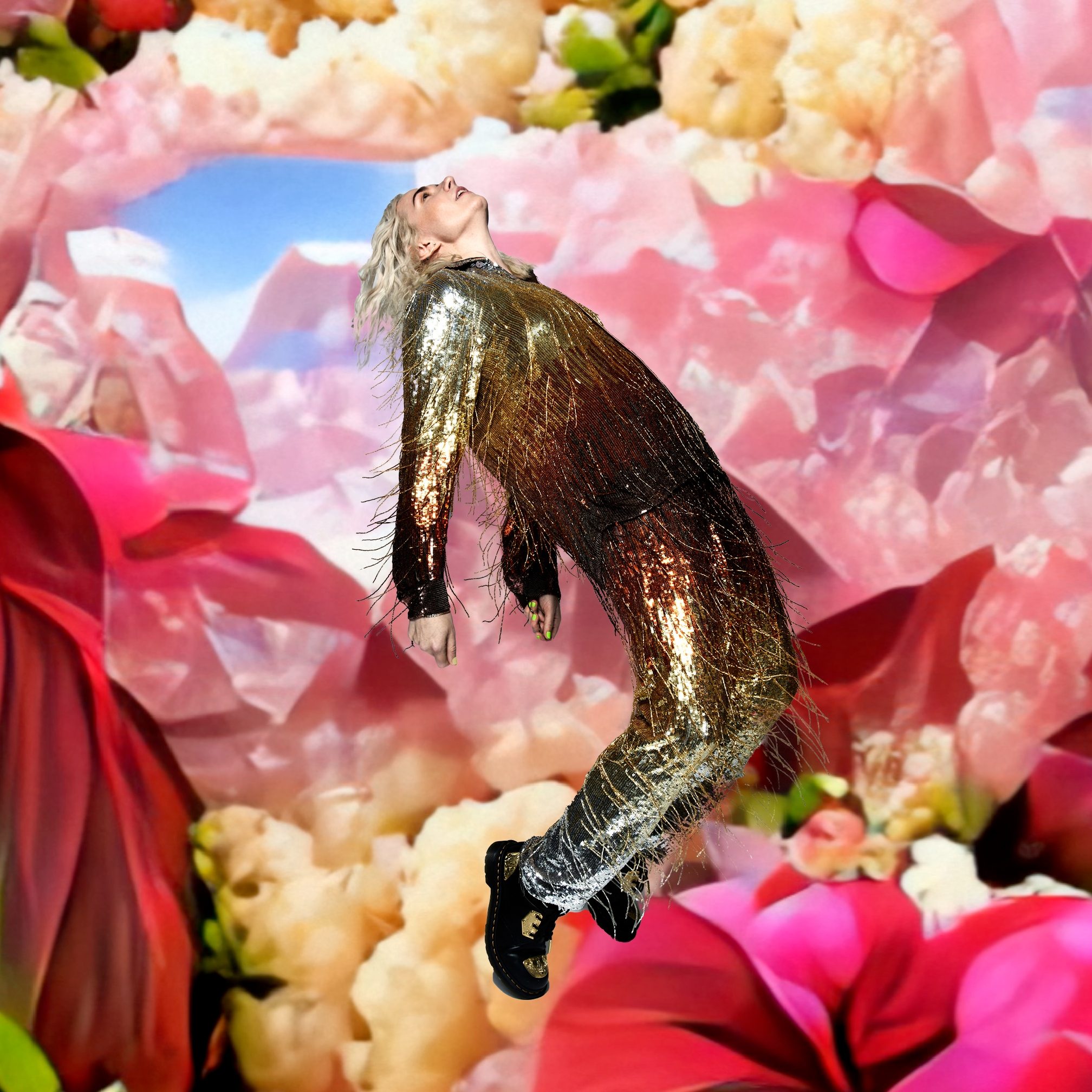
HAAi’s journey into dance music has been well documented—she started out playing in psych-rock bands at home in Australia, before moving to the UK as part of shoegaze duo Dark Bells. She was devastated when the band broke up, until her neighbour at the time gifted her his old MacBook Pro, which had Logic installed on it, and that was how she started experimenting with production. Although Throssell enjoyed clubbing, guitars were her world. She never chose to listen to house or techno, that is, until she saw Ben Klock at Berghain. We laugh together at how clichéd that sounds, the religious Berghain experience. But after all, how does a cliché become a cliché?
Read this next: 10 days on the road with Ben Klock
Twice in our conversation, Throssell reflects on the fortunate chain of events that have brought her to where she is today. “I often look back and think, ‘if that link in the chain was missing, would I be here?’” she explains. The links in the chain start at the beginning (stealing her sisters’ guitar and teaching herself a few important chords) and continue to include: moving to the UK, the neighbour with the laptop, Berghain, Ridley Road, Phonox and playing with The Blessed Madonna (who became a mentor of hers). The pandemic has also proved to be a link in the chain (though not without its hardships and challenges), as has Throssell having recently been diagnosed with ADHD. “It was a relief actually,” she admits. “It makes sense of how I write.”
HAAi’s music has a tendency to change gears at a moment’s notice, which can feel jarring, but as Throssell now explains, it’s a reflection of how her brain sometimes operates and how she observes the world. This quick-fire chop and change manifests itself many times on ‘Baby, We’re Ascending’. But despite the record’s loud, fast, rasping and startling moments, it is the most affecting and euphoric music HAAi has made to date. For one, it’s a product of the circumstances in which it was made, she explains. “When you don’t have a dancefloor or a crowd to play to, your music becomes more reflective.” Second, the presence of her own singing on the record immediately makes the music more vulnerable.
Read this next: Vocal House: The 30 All-Time Biggest Anthems
‘Baby, We’re Ascending’ has been pieced together like a mixtape. The 13 tracks (including two interludes of under two minutes) on the record are connected by the whirring of tapes, crackling of radio interference, bleeps and bloops of adjusting the frequency to find signal, vocal snippets from presenters, little snatches of a ’90s rave horn and the sound of shuddering and grinding mechanics. In the age of the algorithm, Throssell appreciates that many people that listen to the record probably won’t listen to it right the way through. But for those that do, the full sonic adventure awaits.

The opening track ‘Channels’ represents HAAi’s struggle with how abruptly her focus can make a U-turn. Machines grind into gear, extraterrestrial pads and bleeps fill the space, a thumping techno rhythm enters the chat for barely 10 seconds and then departs, and the final bars sound like the dramatic glissando that booms out from the front of a cinema just before the film starts. “That whole track is meant to feel like you’re changing the channel,” Throssell explains. “For me it sets up what the album is about, because it obviously takes some twists and turns.”
The grinding mechanics, banging rhythms and spectral textures are present throughout the record, which spans atmospheric techno (‘Pigeon Barron’), electro-leaning love songs (lead single ‘Bodies of Water’), downtempo broken techno (‘I’ve Been Thinking A Lot Lately’) and perhaps the most chaotic track of them all, ‘Purple Jelly Disc’. Brighter, more meditative and euphoric moments come courtesy of the record’s deepest inhalation, ‘Biggest Mood Ever,’ which features vocals from Hot Chip’s Alexis Taylor, the warm and uplifting chords of ‘FM’ and the album’s sweeping title-track, made with Throssell’s close friend Jon Hopkins. ‘Orca’ was recently renamed from its original title of ‘Catpowerwoman5000’, because in her listening session with Hopkins, they related the latter parts of the track to the stirring sound of whale song.
Read this next: Jon Hopkins turned to meditation and psychedelics to overcome writer's block
One of the most important tracks on the record for Throssell is ‘Human Sound’, which features poet, trans activist and model Kai-Isaiah Jamal and singer, songwriter and instrumentalist Obi Franky. Throssell and Jamal live in the same building, and when they met during lockdown, they found they had an instant connection. “We had many conversations about the erasure of the queer Black roots of techno and dance music,” Throssell says. “That was a really big discussion around us making a track together.”
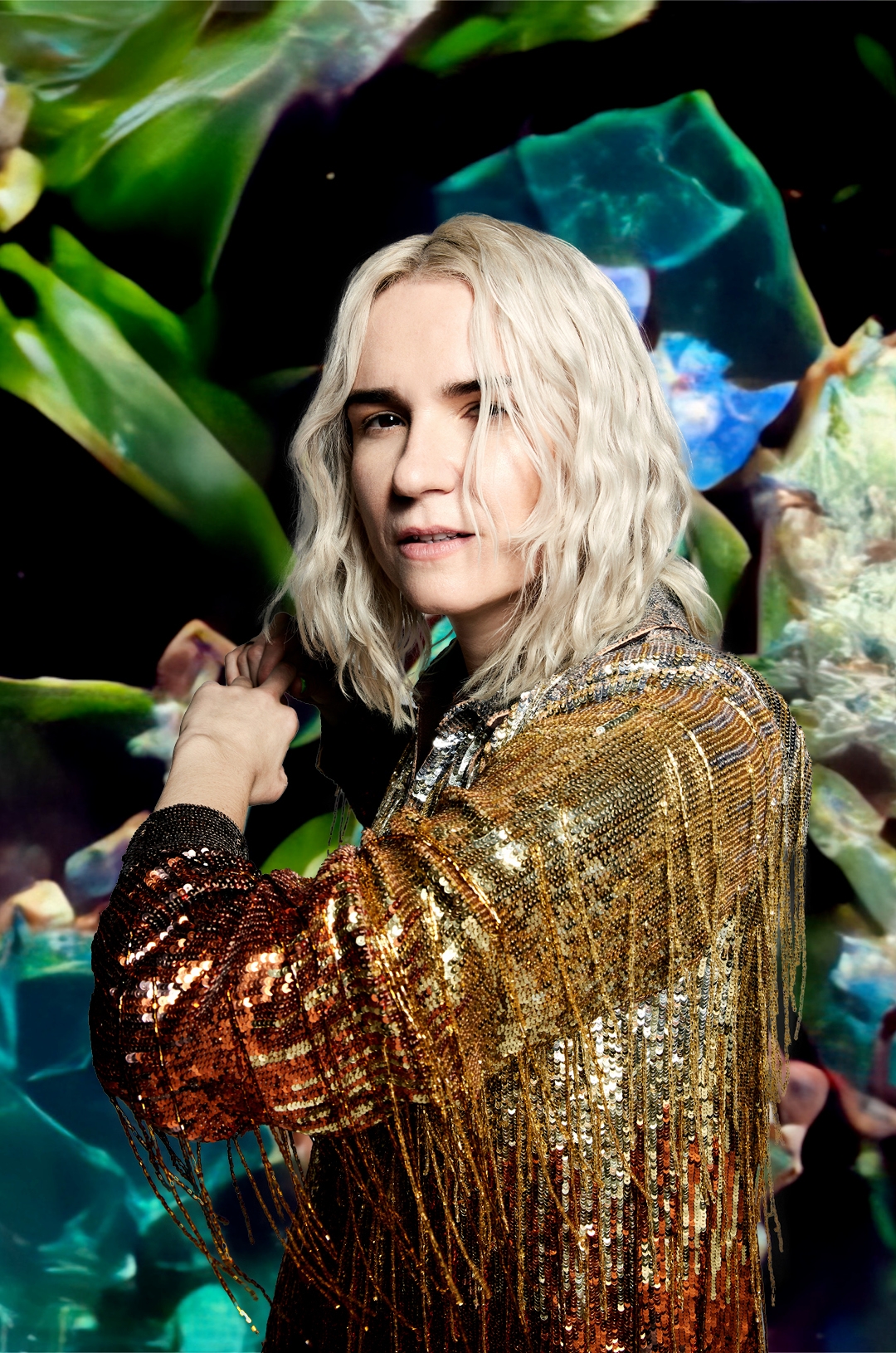
Collaboration has played a big part in HAAi’s debut LP, which is surprising if you know that, until recently, she had a strong aversion to working with anyone except herself since going solo. In a male-dominated world where a woman’s ability is so often questioned or doubted, Throssell became obsessively protective over her work. The process of making ‘Baby, We’re Ascending’ has opened new doors and given Throssell a renewed confidence in her methods, as well as an all-new understanding of how special it can feel to work on something with like-minded people.
Though collaborations are a new venture for Throssell, she has always been open to helping people that have questions, or aspirations in their own production or DJing. She makes a concerted effort to respond to all the messages she receives on social media asking for tips, and Radical New Theory, the label she runs with Alice, was started with the intention to help give great music the exposure it deserves. “As my profile has grown, I have the opportunity to start to bring other people up. In the same way that The Blessed Madonna took me under her wing at the start, I feel duty-bound to pay that forward.”
Read this next: How DJ diversity clauses can make dance music a better place
In a similar vein, Throssell also sees her growing platform as a way to have a voice when it comes to programming for festivals and club nights. She and her team have added an inclusivity rider to her contract, and she says it’s important to her that promoters show willingness to ensure their bookings are inclusive. As a queer woman, Throssell was even told by promoters in the past that she had been booked last minute “as the diversity card.” If HAAi receives a booking request and the proposed line-up is too white, too male, too imbalanced, she has a list of artists at varying levels she shares with promoters by way of constructive criticism. “99% of the time it’s well received,” she says. “It’s nice to feel you can play a part in that, and see some really talented artists getting the platform they deserve.” A lot of the artists in Throssell’s sphere are making similar changes, she says. “It’s nice to feel that there is some progression with inclusivity. And that it’s moving beyond tokenism.”
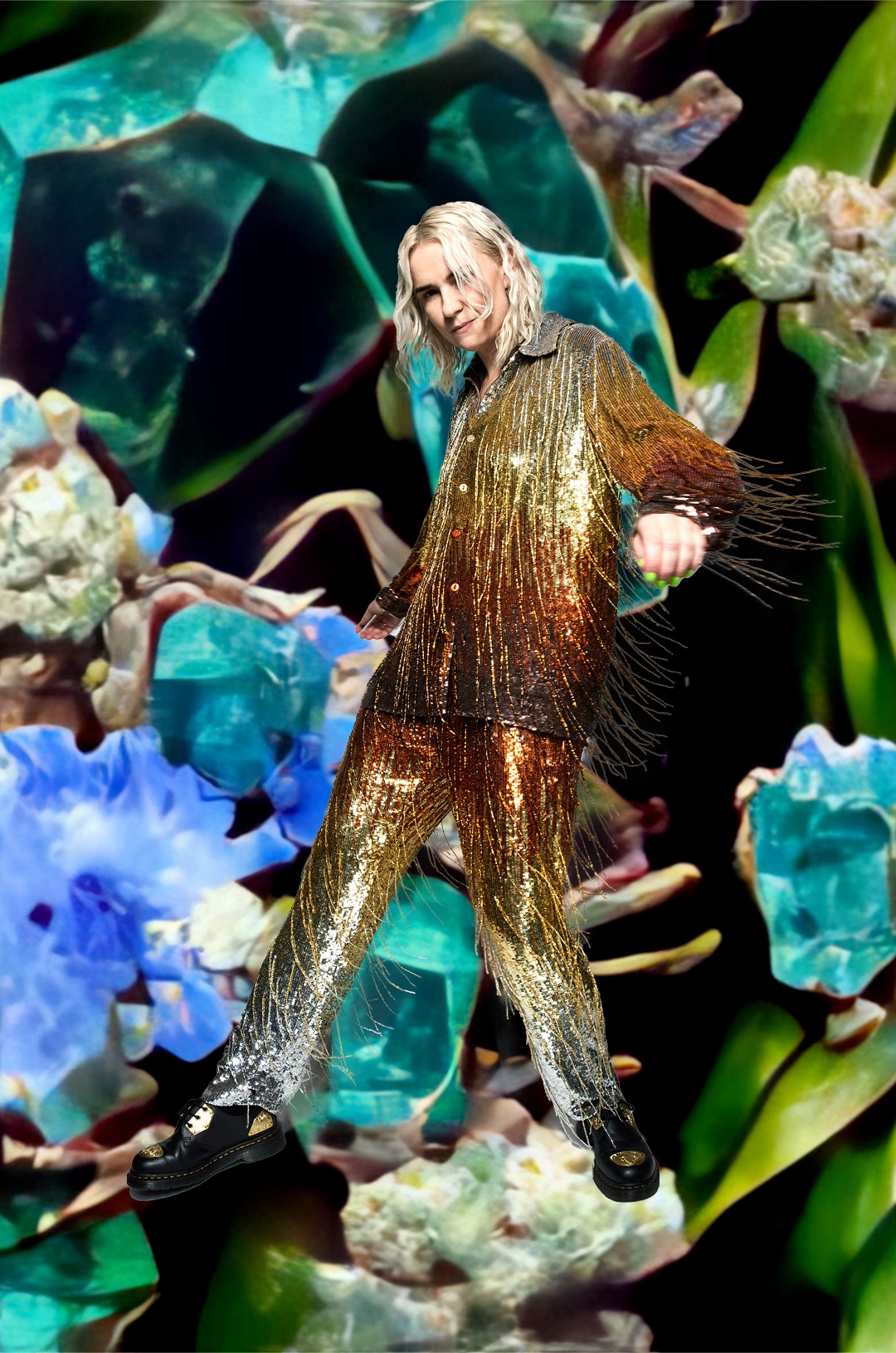
HAAi has recently started playing with Garçon Sauvage, the queer collective who put on huge parties across France. “It’s fucking incredible,” she says with a grin. “I love playing to anyone that loves music, but there’s something about playing music for people that you see yourself in, and vice versa, that is so magic.” A conversation with Midland, about how they are both queer artists who often play to a predominantly straight crowd, has sparked Throssell’s interest in playing for and within the queer community more regularly. “Since we’ve been back at work I’ve had this real feeling that I’ve bypassed playing as part of my community,” she explains. “Because I was so focused on trying to make something of my career.” Another thing she wants to continue to focus on, Throssell says, is putting into practice the idea of a fully safe space, that isn’t just inclusive in the booth but also on the dancefloor. It’s something she’s been discussing with friend Saoirse, whose new, triumphant festival Body Movements is a space created to celebrate queer bodies in dance music.
Read this next: Body Movements festival was a landmark occasion for queer self-expression
As our conversation is beginning to wrap up, we ask: What is HAAi excited for? In a nutshell, everything. Throssell is excited about her album, to work on a live show, to be in a world where parties don’t have that COVID-19 layer of fear and risk, to release more music on Radical New Theory, for the track ‘Lights Out’ she’s made with Romy and Fred again.., and continuing to branch out. “I’m excited about doing things that I didn’t allow myself to do before,” she says. “I’m excited about everything!”
The phrase “it takes a village” comes to mind thinking about HAAi’s achievement in ‘Baby, We’re Ascending.’ In opening herself up to collaborating, Throssell has found new meaning to her music making. In recognition of this, the LP gatefold design is a collage of everyone who has contributed to the making of the album. “It was an important thing for me to do,” she says. “I’m so proud to have all these people be a part of it.” And even though they ate the Monstera, the cats have made the cut.
HAAi's debut album ‘Baby, We’re Ascending’ comes out via Mute Records in June
Katie Thomas is a freelance writer, follow her on Twitter
[HAAi wears: Striped Knit - Anderson Bell from Goodhood / Beret from Gucci / Green Fluffy Coat - Stand Studio from Goodhood / Gold sequined suit - Ashish Gupta / White Terry Towelling shirt and shorts, Black Loafer and socks - Prada / Badged Coat and trousers - N Palmer Studio]


